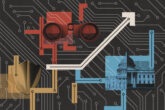August 04, 2024
The 1960s Novella That Got AI (Mostly) Right
A secret military project. A vast artificial mind. Questions of consciousness. These form the premise of Dino Buzzati’s The Singularity, originally published in 1960 at the dawn of the field of artificial intelligence (AI). The novella follows Italian scientist Ermanno Ismani, summoned by the Ministry of Defense to work on a top-secret project, as he ventures with his wife, Elisa, to a sprawling machine hidden in the mountains of the Italian countryside. The machine’s intelligence far surpasses that of humans—and its creators claim that the machine has come alive.
The reality is that AI systems won’t have to break out and take over civilization; they are already connected to the internet and increasingly embedded in our lives.
Written a half-century before the deep-learning revolution, much of the technology in The Singularity is delightfully retro, calling back to the early Cold War era of secret military projects, atomic weapons, and computers that filled entire rooms and ran on punch cards. Yet Buzzati’s prescient story, told in a new translation by Anne Milano Appel, is buzzing with many issues that society still grapples with today. Namely, Buzzati’s characters struggle to grasp the magnitude and consequences of the machine they have built.
Read the full article and more from Foreign Policy.
More from CNAS
-
Technology & National Security
Prepared, Not ParalyzedExecutive Summary The Trump administration has embraced a pro-innovation approach to artificial intelligence (AI) policy. Its AI Action Plan, released July 2025, underscores t...
By Janet Egan, Spencer Michaels & Caleb Withers
-
Indo-Pacific Security / Energy, Economics & Security / Technology & National Security
Selling AI Chips Won’t Keep China Hooked on U.S. TechnologyU.S. policy should not rest on the illusion that selling chips can trap China inside the American tech ecosystem....
By Janet Egan
-
Technology & National Security
Scaling Laws: The Open Questions Surrounding Open Source AI with Nathan Lambert and Keegan McBrideKeegan McBride, adjunct senior fellow at the Center for a New American Security joins to explore the current state of open source AI model development and associated policy qu...
By Keegan McBride
-
Energy, Economics & Security / Technology & National Security
Export Controls: Janet Egan, Sam Levy, and Peter Harrell on the White House's Semiconductor DecisionJanet Egan, a senior fellow with the Technology and National Security Program at the Center for a New American Security, discussed the Trump administration’s recent decision t...
By Janet Egan




